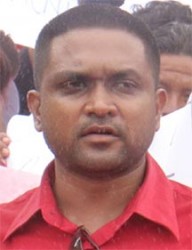The projects under the government’s $88M Hinterland National Secure Livelihoods Programme (NSLP) have yielded success with the exception of the Tobago Hill Hassar fish ponds, according to Permanent Secretary of the Ministry of Amerindian Affairs Nigel Dharamlall.
Finally responding to enquiries about the project from Stabroek News, Dharamlall said that over the years there have been some successes and challenges.
Stabroek News has been continuously reporting on the state of these projects and has verified that the Tobago Hill fish ponds have been abandoned due to the unfeasibility of the initiative and poor weather. Residents have complained that there aren’t sufficient markets available for their produce as it regards the other projects, so they’ve either scaled back their operations or abandoned them completely.

Dharamlall explained that there were seven types of projects implemented in 15 villages as a pilot venture to develop a sustainable livelihood for Indigenous communities in Region One through agriculture, aquaculture and apiculture. He added that this was pursued because of evidence of the activity taking place in the organic space and was implemented through collaborative efforts with the residents and the farmers.
While noting that there have been successes and challenges, Dharamlall said that the projects might not have taken off at the rate they had hoped but added that the ministry was satisfied that persons have chosen to continue the work they have initiated.
According to Dharamlall, the projects are a people-driven venture and require the perseverance of the people for them to succeed. He expressed disappointment that the Tobago Hill fish ponds have failed due to the lack thereof. He, however, made it clear that he is in no way trying to negatively portray the Amerindian people in Tobago Hill but rather attributed the failure to the fact that the community is a transition community, still adapting almost nine years after, to their new surroundings and way of life.
Dharamlall indicated that all the other projects are still ongoing and have yielded some mild successes. He cited the Waini Secrets cosmetic products that have emerged out of the crab rearing in the area; honey being produced from the bee hives and sold in and outside of Region One; and passion fruit and pineapple being sold readily. He pointed to a specific challenge of pricing issues that affected the farmers’ willingness to produce and he said it was a business decision by the farmers to scale down their operations because of the price buyers were willing to pay for their produce. The main purchaser of the farmers’ produce was Amazon Caribbean.
Dharamlall said that the issue of pricing was one to be negotiated between those two parties, the buyer and seller, and the government cannot be blamed for that. He, however, indicated that the government’s efforts to certify the produce at the taxpayer’s expense goes to show its commitment to developing a sustainable livelihood for the people of Region One. He cited his ministry’s efforts to network on behalf of the farmers to find more markets for their produce but said that ultimately the price they’re willing to sell for and quantity they’re willing to produce is their decision.
Pointing to another success, Dharamlall said that just two months ago the Aruka ginger farmers, who currently farm four to five acres of land, requested a processing plant be built to support expansion of their activities. This, he said, is testament to the success of the overall initiative of the ministry.
Dharamlall added that the ministry is willing to work along with the people if they intend to proceed further or pick up where they would have left off on any of the projects. He also said that the lessons learnt from this pilot project will go a long way to ensuring better delivery of future endeavours.
The other projects included a pineapple farm at Wauna, a crab rearing pen at Imbotero, more than 40 acres of passion fruit farms at Whitewater, Hotoquai, Hobodai and Wauna and honey projects in Arukamai, Hobodai and Hotoquai.





